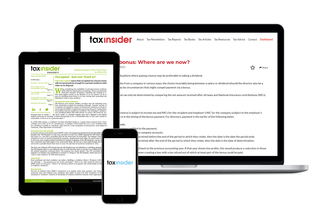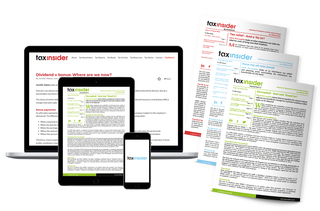New articles published
in March 2026
-
Tax Relief for Expenses: Do You Have the Evidence?
Question: What do the following statements have in common?
• My wife has been seeing aliens.
• My mother-in-law is a witch and put a curse on me.
• I fell in with the wrong crowd.Mark McLaughlin warns that a lack of supporting evidence can be fatal to a tax relief claim for expenses.
-
Tax Year End: Making the Most of Allowances and Reliefs
The current tax year ends on 5 April, making this a good time for individuals to review their finances and ensure that they are making the most of available tax allowances and reliefs.
The following is not an exhaustive list, but there are some practical ideas to consider before the tax year end.
Richard Curtis suggests some tax saving ideas for UK resident individuals.
-
Airbnb and VAT: Accounting After the Upper Tribunal Decision
Airbnb-type supplies of holiday accommodation are becoming increasingly popular, and property owners are putting their properties up with these types of companies and websites as well as letting them out directly themselves.
The types of property used range from small flats to large houses. In normal circumstances, the rental of residential accommodation is exempt from VAT, so no VAT is due on residential property rental. However, there are some exceptions to the VAT exemption for the rental of residential property. The supply of hotel and ‘similar accommodation’ is not exempt and is subject to VAT at the standard rate of 20%.
Andrew Needham looks at changes to the accounting for VAT in relation to Airbnb transactions following a recent Upper Tribunal decision.
-
CGT Enhancement Expenditure: What Is Actually Allowable?
HMRC regards the capital gains tax (CGT) provisions of TCGA 1992, s 38 (acquisition and disposal costs, etc.) as exhaustive. So, if an item of expenditure is within any of the categories of expenditure identified at section 38, it is allowable; if not, then it is not allowable.
Ken Moody muses over what is allowable as ‘enhancement’ expenditure for capital gains tax purposes, and encounters what seems to be a proverbial ‘Catch 22’ situation.
-
Inheritance Tax Planning: The Case for Skipping a Generation
When gifting assets, it’s sometimes beneficial to ‘skip’ a generation to avoid some tax traps for the unwary. Tristan Noyes explores some scenarios.
As the UK’s ‘most hated tax’, many people are focussed on avoiding inheritance tax (IHT). IHT is often viewed as voluntary because it is easy to avoid – simply give your assets away and try not to die for seven years!When gifting assets, it’s sometimes beneficial to ‘skip’ a generation to avoid some tax traps for the unwary. Tristan Noyes explores some scenarios.
-
Travel and Subsistence: Conditions for Tax Relief
Claims for travel and subsistence costs may initially appear straightforward. However, they frequently raise complex compliance issues. This complexity largely arises from HMRC’s strict application of the statutory requirement that expenses must be incurred ‘wholly, exclusively and necessarily’ in the performance of employment duties, particularly where expenditure has both personal and professional elements.
Jennifer Adams considers the conditions that must apply when determining whether tax relief can be claimed for travel and subsistence costs.
-
Partnerships: How Are They Taxed in the UK?
A sole trader is the simplest way of operating a business with respect to tax; a partnership is another layer of complexity, albeit fairly minimal.
Chris Thorpe outlines how partnerships fit into the UK tax system.
-
Q&As with Arthur Weller
Some of our most popular articles
-
Dividends or bonuses? We can work it out!
Consider the following scenario:
'On a wintry sunny morning, Alan was reviewing his company’s January 2024 management accounts. Alan was the sole director and 100% shareholder of Llandudno Hotels Ltd, which operated two large hotels in Llandudno. The business was on course to healthy pre-tax profit of around £650,000 for the year ended 31 March 2024. Alan had been planning to pay himself a substantial ‘bonus’ before the year-end'.
What does Alan do?
Peter Rayney examines an owner-manager’s cash extraction following the numerous tax and National Insurance contributions changes.
-
Use them or lose them: 2023/24 tax allowances
As the tax year draws to a close, it is prudent to review one’s 2023/24 tax allowances and consider whether there is scope for utilising any unused allowances so they are not lost.
Sarah Bradford explores options for using 2023/24 tax allowances so they are not wasted.
-
Record-keeping in a digital age
Lee Sharpe looks at taxpayers’ record-keeping obligations in light of HMRC’s inexorable march to digital everything (almost).
Historically, HMRC has been quite relaxed about whether original records must be maintained or digital facsimiles (scans, etc.).
-
Trap for business owners seeking CGT incorporation relief
HM Revenue and Customs (HMRC) recently commenced a ‘One to Many’ campaign, targeting taxpayers who incorporated property businesses in the tax year 2017/18 but reported no capital gains tax (CGT) liability in their tax returns on the basis that ‘incorporation relief’ applied in full.
Mark McLaughlin highlights a potential trap for business owners seeking capital gains tax incorporation relief.
-
Q&As with Arthur Weller
Subscription Benefits
We asked our subscribers what they love about Tax Insider Bundle.
These are the top 7 reasons that they gave us:
Monthly Newsletter
Tax Insider Bundle…





